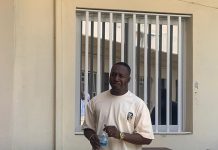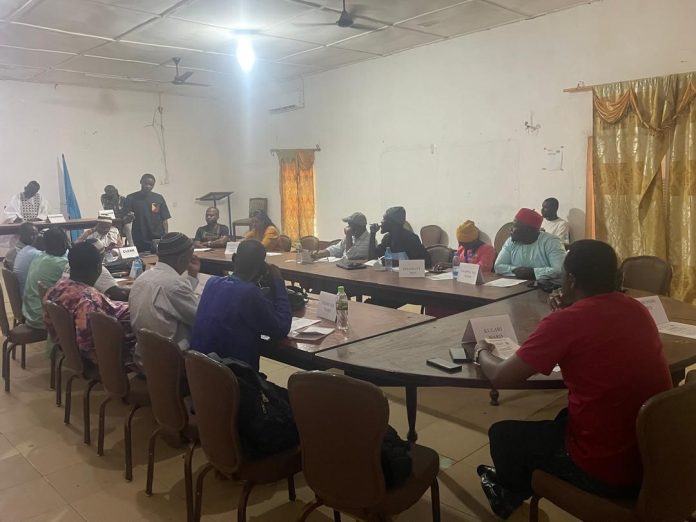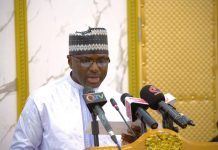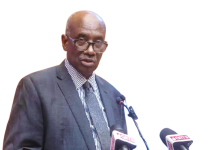By Lamin Fatty
What was expected to be a routine general meeting of the Basse Area Council on Wednesday, June 25, 2025, descended into a dramatic confrontation between the Chairman, Mahamadou Ceesay, and his Vice Chairman, Abubacarr M. Danjo, over the controversial purchase of a borehole drilling machine worth over D750,000. The verbal clash escalated to a point where Chairman Ceesay ordered all journalists and observers out of the council chambers and abruptly recessed the meeting.
The meeting, the fifth general council session held this year, began at the Basse Area Council Chambers with opening remarks from Chairman Ceesay. Among the key updates he provided to council members was the resignation of the nominated youth councillor. Ceesay explained that the resignation was received via email and that the councillor cited personal reasons for stepping down from her role.
“Our youth councillor has submitted her resignation via email, and I acknowledge the receipt. On personal grounds, she said she cannot continue,” Chairman Ceesay announced. He added that he initially responded by giving her a one-month period to reconsider her decision, but she reaffirmed her resignation after the period elapsed. “I also wrote back to her that her resignation is accepted and that letter was shared with all general members,” he said.
With nearly a month passing since the resignation, the chairman declared that the position could not remain vacant indefinitely. He said he would begin the process of consultations to fill the seat. “The law clearly states that all interest groups, whether political or non-political youth groups, can submit their nominated candidates to the office of the chairman,” Ceesay explained.
But it was the second item on the agenda — the council’s water project and the procurement of a borehole drilling machine — that ignited controversy. Chairman Ceesay told the chamber that the water project had been carried over from 2024 after a previously approved budget failed due to a lack of funds. This year, he said, the budget allocation was followed through, and the machine had been successfully procured.
“We are happy to inform you that the borehole drilling machine has been purchased and is functional,” Ceesay announced. He said the procurement and finance departments were working to launch drilling operations in three communities by the first week of July, prioritizing those who had already submitted borehole proposals. However, he admitted that the machine arrived incomplete.
“I am not an expert,” Ceesay said, “but when the machine arrived, it did not come with all the materials needed for full operation. Despite that, it is functional and will begin work soon.”
That admission immediately triggered a fiery response from Vice Chairman Abubacarr M. Danjo, who is also the councillor for Sare Ngai Ward. Danjo criticized the handling of the procurement process and demanded full disclosure on the cost, components, and decision-making involved.
“Let us know the purchase details. What was spent on this machine? And why did it not come with all its materials?” Danjo asked sharply. “We all sat here and debated that we should buy our own borehole drilling machine as a council. Now, we are being told the machine came incomplete.”
- Danjo, a former drill operator with experience drilling over 40 boreholes in the region, said he was initially involved by the chairman to document everything about the machine and its necessary materials. “After I submitted everything, the chairman went ahead and bought the machine without including me — not as vice chairman, not as a member. And now we hear the machine didn’t come complete? That is a big disappointment,” he declared.
He added that every machine he had previously ordered — even before entering public service — arrived with all its required materials. “You cannot demand to buy a machine without specifying its capacity and components. Now if the chairman says the machine is incomplete, he must explain that to us.”
Danjo further suggested that responsibility for the operation of the machine should not lie solely with the administration. He called for a management committee to oversee and monitor its use. “We didn’t only purchase this machine for council projects. It should generate revenue for the council. That’s how we recover what we spent. We must put things in order,” he insisted.
Chairman Ceesay then redirected the questions to the council’s finance director, Mr. Lamin Jassey. In response, Jassey said the issue was not that materials were missing entirely, but rather that some of them could not be used in the local context and required modification. “It’s not that the machine did not come with all its materials,” he explained. “Some of them can’t be used here, and others need to be modified to work.”
On the financial side, Jassey failed to provide an exact figure but gave an estimate. “The expenditure is done. I think we spent about seven hundred and fifty or seven hundred and sixty thousand dalasis (D750,000–D760,000) cumulatively on the machine,” he said.
That response did little to satisfy the vice chairman, who expressed outrage. “It is very saddening and disgraceful to spend D750,000 on something and still not have everything in place,” Danjo said. He pushed further, asking, “Or is it inclusive?” To which Jassey replied, “It is accumulative.”
Danjo then demanded clarity on how the cost had reached D750,000. “What I sent to the chairman were two options — one for D300,000 and another for D500,000. Now it’s D750,000? Where’s the breakdown? Where are the documents?” he asked, visibly frustrated.
He accused the council of lacking transparency and warned that the machine could become a waste of taxpayer funds without proper oversight. “If we leave this machine in the hands of people who are not monitored, we’re just going to waste our taxpayers’ money,” he warned.
Danjo also raised concerns about a team allegedly tasked with managing the machine. “Who created this team? Who are its members? Are we, the general council members, aware of this team?” he asked. “It seems some people have already discussed and decided on the machine. Now we’re just being informed informally — and we will not accept that. We are here to protect taxpayers’ money.”
Chairman Ceesay then responded firmly, stating that no such team had yet been formed. “Let me clarify — there is no team created yet to be responsible for the machine,” he said. “And I must register my disappointment and dismay with the contract committee. I received all your reports, and never once was a red flag raised about this.”
Ceesay appeared visibly agitated. “What you heard and what is happening are different,” he said. “I am telling you what I know, and I will never look anyone in the eye and cheat the people of URR.”
As the exchange between the two escalated and the atmosphere in the chamber became increasingly tense, Chairman Ceesay abruptly ordered all journalists and observers out of the room. “We are going for recess,” he declared, ending public access to the session and leaving lingering questions unanswered.
The dramatic ejection of the press and observers underscores the rising internal tension within the Basse Area Council and growing public scrutiny over financial accountability and transparency in local government operations.





















